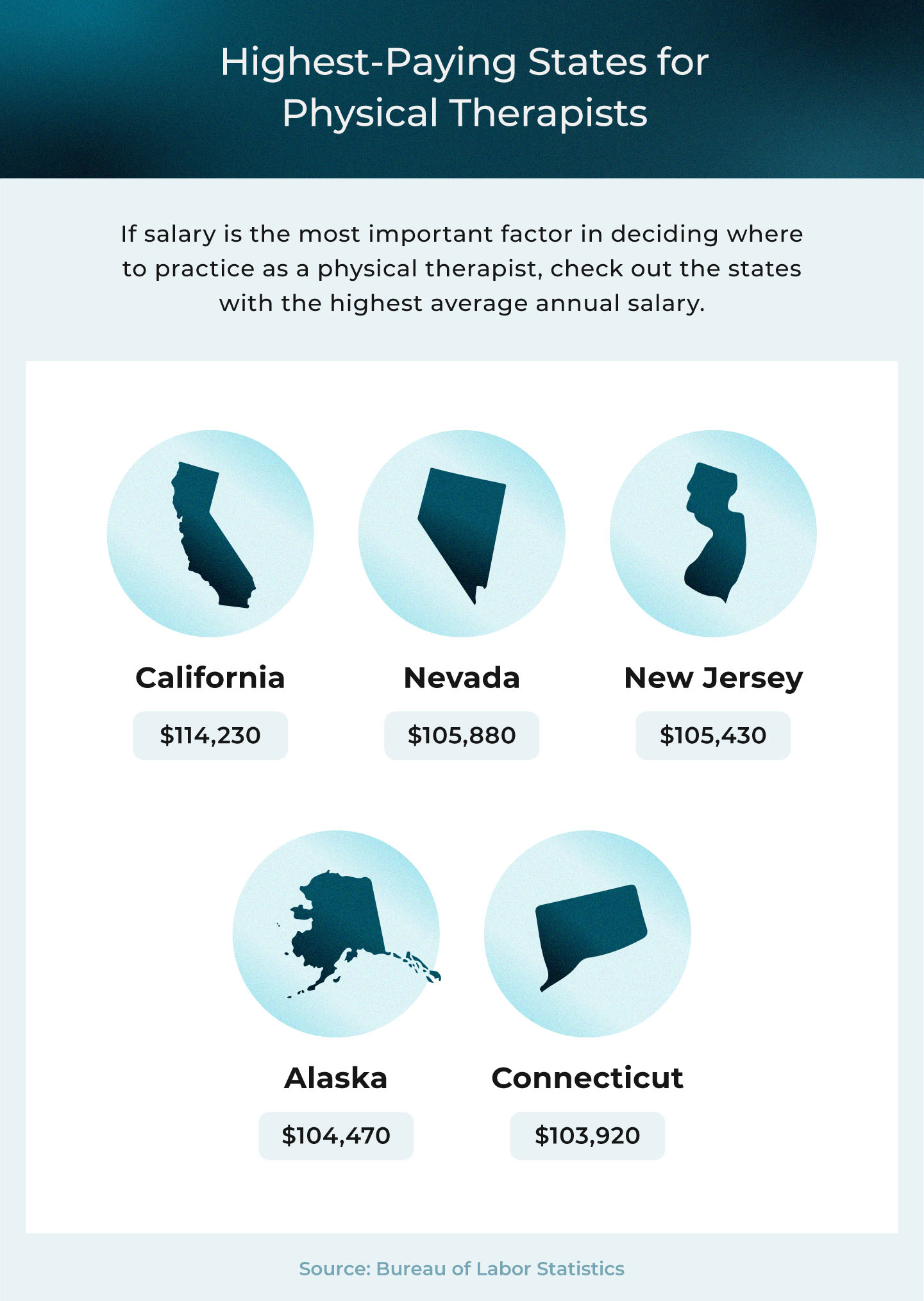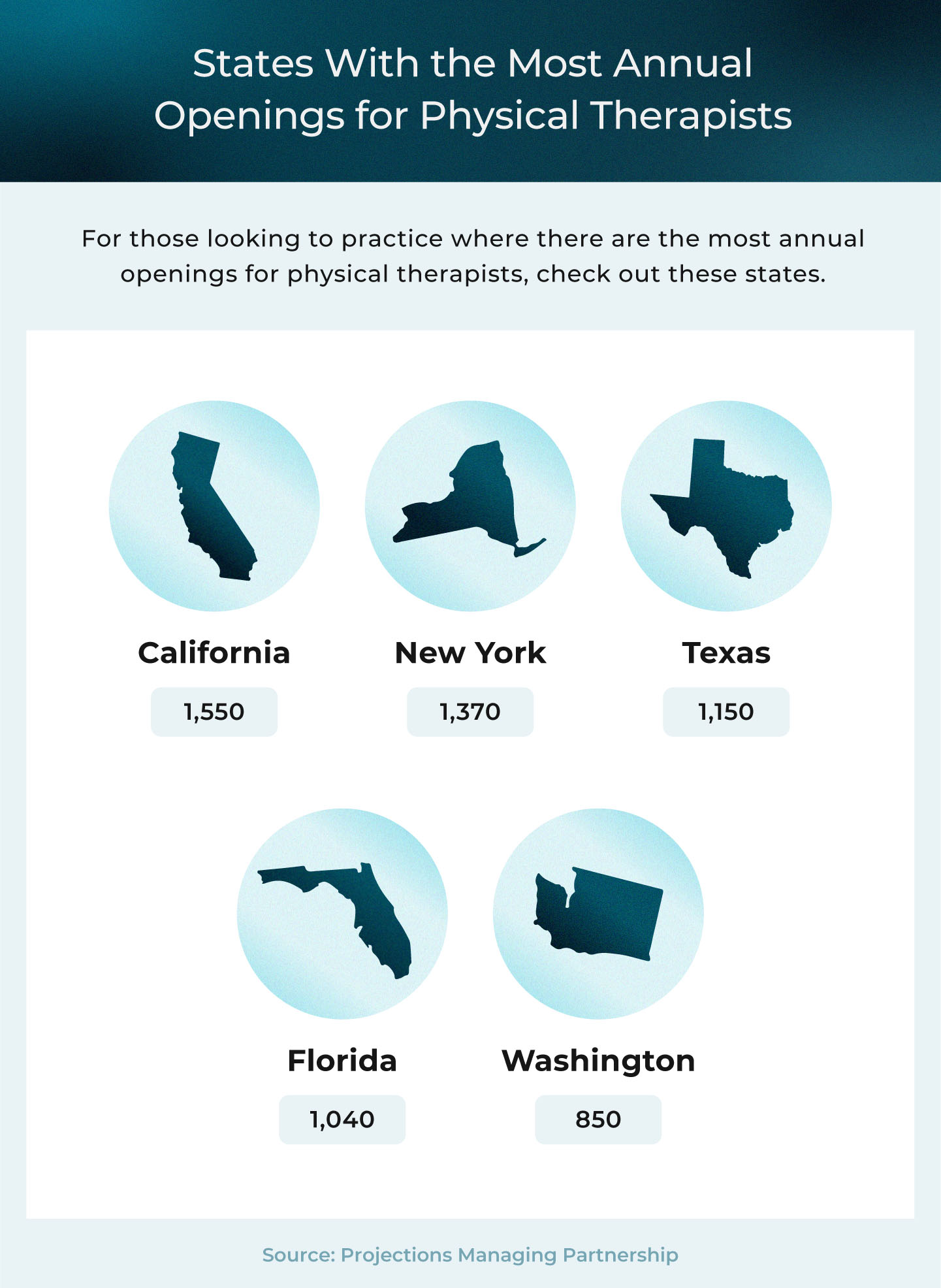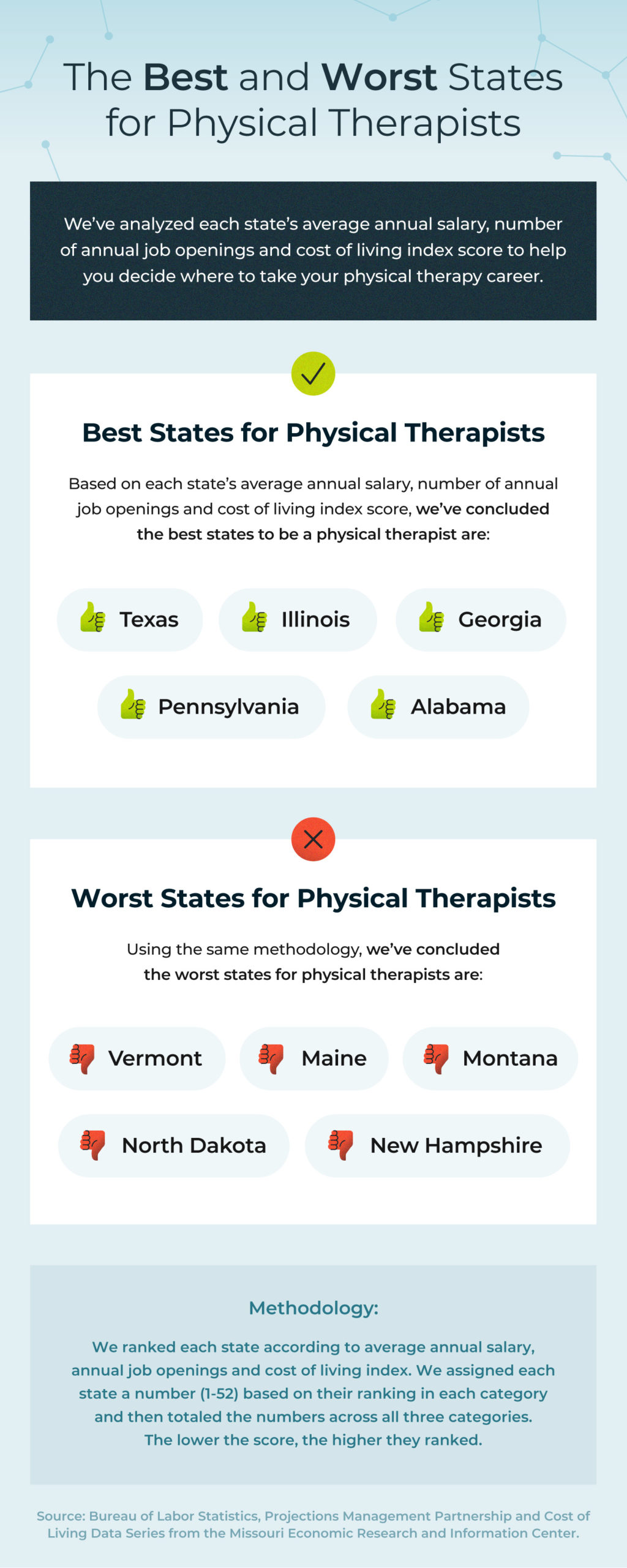

Physical therapists have one of the most rewarding jobs in the world. And that statement is true from several perspectives—including a financial one.
The median salary for a practitioner with a Doctor of Physical Therapy degree is $97.720.1
But, this figure only tells half of the story. Salaries fluctuate due to multiple variables, such as which physical therapy advancement opportunities you pursue, but location is one of the most important factors.
To better understand your potential salary as a physical therapist, we’ll explore wage projections from each U.S. state and territory.
Table of Contents:
Physical Therapist Salary by State
Using annual salary data from the Bureau of Labor Statistics (BLS), projected annual openings from the Projections Managing Partnership(PMP) and cost of living index scores from the Cost of Living Data Series from the Missouri Economic Research and Information Center, we’ll examine your potential future after you have pursued a physical therapy graduate program and become a licensed physical therapist—no matter where in the country you find yourself.
Note that the most recent numbers from the BLS are from May 2022, and salaries may have changed in the time since.
Learning more about physical therapists’ salaries will help you answer, “Is a DPT degree worth it?” We think you’ll agree that it is.
| State | Hourly mean wage | Annual mean wage | Annual Job Openings | Cost of Living Index |
|---|---|---|---|---|
| Alabama | 46.69 | 97120 | 170 | 88.2 |
| Alaska | 50.23 | 104470 | 30 | 126.4 |
| Arizona | 48.07 | 99980 | 430 | 110 |
| Arkansas | 44.79 | 93160 | 140 | 88.5 |
| California | 54.92 | 114230 | 1550 | 136.4 |
| Colorado | 46.24 | 96170 | 440 | 106.9 |
| Connecticut | 49.96 | 103920 | 220 | 113.9 |
| Delaware | 46.38 | 96460 | 70 | 100.8 |
| District of Columbia | 46.52 | 96760 | 40 | 145.3 |
| Florida | 44.10 | 91730 | 1040 | 101 |
| Georgia | 46.47 | 96670 | 470 | 90 |
| Hawaii | 48.14 | 100130 | 50 | 179.2 |
| Idaho | 42.67 | 88750 | 120 | 99 |
| Illinois | 47.80 | 99420 | 500 | 91.8 |
| Indiana | 44.61 | 92790 | 310 | 91.1 |
| Iowa | 42.37 | 88120 | 160 | 89.9 |
| Kansas | 44.20 | 91930 | 140 | 87.4 |
| Kentucky | 41.45 | 86220 | 200 | 93.2 |
| Louisiana | 46.07 | 95820 | 160 | 90.7 |
| Maine | 41.64 | 86600 | 60 | 110.7 |
| Maryland | 46.27 | 96250 | 340 | 114.8 |
| Massachusetts | 46.05 | 95780 | 520 | 148 |
| Michigan | 43.06 | 89570 | 490 | 91 |
| Minnesota | 42.85 | 89130 | 250 | 94.4 |
| Mississippi | 46.41 | 96520 | 110 | 86.7 |
| Missouri | 43.17 | 89790 | 280 | 88.3 |
| Montana | 41.12 | 85530 | 80 | 103.1 |
| Nebraska | 44.23 | 91990 | 130 | 91 |
| Nevada | 50.90 | 105880 | 140 | 101.1 |
| New Hampshire | 43.86 | 91230 | 80 | 115.6 |
| New Jersey | 50.69 | 105430 | 530 | 110.3 |
| New Mexico | 44.26 | 92050 | 110 | 93.9 |
| New York | 49.80 | 103580 | 1370 | 126.5 |
| North Carolina | 44.33 | 92200 | 450 | 96.2 |
| North Dakota | 39.93 | 83060 | 50 | 94.3 |
| Ohio | 46.09 | 95870 | 510 | 92.2 |
| Oklahoma | 43.80 | 91100 | 160 | 86.8 |
| Oregon | 46.16 | 96010 | 210 | 114.7 |
| Pennsylvania | 46.87 | 97490 | 770 | 94.8 |
| Puerto Rico | 23.47 | 48820 | 40 | |
| Rhode Island | 45.49 | 94620 | 60 | 112 |
| South Carolina | 42.39 | 88170 | 220 | 94.3 |
| South Dakota | 42.31 | 88010 | 60 | 91.8 |
| Tennessee | 44.06 | 91630 | 320 | 90.4 |
| Texas | 49.18 | 102300 | 1150 | 93 |
| Utah | 44.02 | 91570 | 170 | 104.5 |
| Vermont | 42.46 | 88310 | 50 | 114.9 |
| Virginia | 46.59 | 96900 | 420 | 101.4 |
| Washington | 48.62 | 101130 | 850 | 115.7 |
| West Virginia | 44.71 | 93000 | 110 | 85.2 |
| Wisconsin | 44.71 | 93010 | 310 | 95.4 |
| Wyoming | 43.71 | 90910 | 40 | 93.2 |
Alabama: $97,120/year2
As per the BLS, physical therapists in Alabama make a mean annual wage of $97,120. That’s $46.69 per hour in a state with a relatively low cost of living. The PMP expects to see around 170 PT job openings each year until 2030.3
The cost of living in Alabama is below the national average, at 88.2 on the index.4
Alaska: $104,470/year2
Up north, those with Doctor of Physical Therapy (DPT) degrees can earn a mean salary of $104,470 per year ($50.23 per hour). In fact, Alaska is the fourth highest-paying state for PTs.
And while the average number of annual job openings may seem low at 30, that figure is consistent with Alaska’s population of less than 750,000.3,5
The cost of living in Alaska is above the national average, at 126.4 on the index.4
Arizona: $99,980/year2
PTs working in Arizona earn a mean annual salary of $99,980, or $48.07 per hour. These health professionals are in demand, too. The state projects that there will be a healthy 430 job openings for PTs each year until 2030.3
The cost of living in Arizona is above the national average at 110 on the index.4
Arkansas: $93,160/year2
If you work at a doctor’s office or hospital in Arkansas, you could earn a mean salary of $93,160/year (or $44.79 per hour). With 140 job openings expected each year, you’ll have plenty of opportunities to apply.3
The cost of living in Arkansas is below the national average, at 88.5 on the index.4
California: $114,230/year2
A licensed physical therapist working in the Golden State is well-paid. California is the highest-paying state for PTs, with a mean annual wage of $114,230 ($54.92 per hour).
In this large state that values exercise and sports, PT demand is growing; the PMP predicts 1,550 physical therapy jobs will open each year.3
The cost of living in California is above the national average, at 136.4 on the index.4
Our San Marcos campus would be a great place to study if you want to pursue physical therapy in California.
Colorado: $96,170/year2
Even if the mountains don’t call to you, the $96,170 annual salary for Colorado-based PTs might. And with a predicted 440 new job openings each year, you could earn that $46.24 per hour sooner than you think.2,3
The cost of living in Colorado is slightly above the national average, at 106.9 on the index.4
Connecticut: $103,920/year2
As the fifth highest-paying state for PTs, Connecticut is a worthy destination for those looking to practice. With a mean annual salary of $103,920 ($49.96 per hour) and around 220 yearly job openings, the state provides an opportunity for those willing to relocate.2,3
The cost of living in Connecticut is well above the national average, at 113.9 on the index.4
Delaware: $96,460/year2
Delaware-based PTs earn a mean annual salary of $96,460, which equates to $46.38 per hour. PMP projects a yearly increase of around 70 physical therapy jobs in the state.3
The cost of living in Delaware is above the national average, at 100.8 on the index.4
District of Columbia (D.C.): $96,760/year2
With a mean hourly rate of $46.52, PTs in the nation’s capital can earn upward of $96,760 per year. As for job openings, you’ll find an average of just 40 annually through 2030, making D.C. a good place to start your private practice.3
The cost of living in D.C. is 145.3 on the index—in fact, it’s the third-most expensive place to live in the country, behind Hawaii and Massachusetts.4
Florida: $91,730/year2
If you enjoy the sun, sand and a mean annual salary of $91,730 ($44.10 per hour), you’ll love Florida. The Sunshine State is home to the University of St. Augustine for Health Sciences’ St. Augustine and Miami campuses, where you can earn your DPT degree within sight of the beach.
Perhaps because the state is a hot spot for retirees, there are an estimated 1,040 PT job openings yearly.3
The cost of living in Florida is just above the national average, at 101.0 on the index.4
Georgia: $96,670/year2
In Georgia, PTs make around $96,670 per year—that’s $46.47 per hour. The career is experiencing significant growth, too—the PMP expects 470 new job openings every year.3
The cost of living in Georgia is below the national average, at 90.9 on the index.4
Hawaii: $100,130/year2
At $100,130 per year ($48.14 per hour), the mean doctor of physical therapy salary in Hawaii is pretty decent. But don’t wait too long to start your practice for surfers; the average number of annual job openings is 50.3
Hawaii is famously beautiful, but you do have to consider its high cost of living, which clocks in at 179.2 on the index, making it the most expensive state in the United States.4
Idaho: $88,750/year2
Physical therapists in Idaho bring home around $42.67 per hour, for a total mean salary of $88,750/year. An average of 120 new PT jobs are created every year.3
The cost of living in Idaho is just below the national average, at 99.0 on the index.4
Illinois: $99,420/year2
Whether you’re in the Windy City or somewhere beyond, you can earn an impressive $99,420 per year ($47.80 per hour). Luckily, the demand for PTs in Illinois is also high, with an average of 500 new openings each year.3
The cost of living in Illinois is below the national average, at 91.8 on the index.4
Indiana: $92,790/year2
Sitting just east of Illinois, Indiana boasts an annual mean salary of $92,790 ($44.61 per hour). According to the PMP, the state will need around 310 new PTs every year until 2030.3
The cost of living in Indiana is also below the national average, at 91.1 on the index.4
Iowa: $88,120/year2
The mean annual salary for a PT in Iowa is $88,120 ($42.37 per hour). With around 160 new jobs opening each year, the Hawkeye state could be a worthwhile destination.3
The cost of living in Iowa is below the national average, at 89.9 on the index.4


Kansas: $91,930/year2
At $91,930 per year ($44.20 per hour), the mean salary for a physical therapist in Kansas is nothing to sneeze at. With an annual average of 140 new jobs opening up, you’d be hard-pressed to find a better state in the Midwest.3
Kansas is one of the least expensive states to live in, with a cost of living that’s 87.4 on the index.4
Kentucky: $86,220/year2
In Kentucky, you can earn an average physical therapist salary of $86,220, which translates to $41.45 per hour. The PMP expects an average of 200 new PT jobs to open in the state every year.3
The cost of living in Kentucky is below the national average, at 93.2 on the index.4
Louisiana: $95,820/year2
Louisiana is near the top of the list, with a mean annual salary of $95,820 ($46.07 per hour). With that said, there are around 160 openings for PTs each year, according to the PMP.3
Louisiana’s below-average cost of living—90.7 on the index—is another plus.4
Maine: $86,600/year2
At $86,600 per year ($41.64 per hour), Maine’s mean salary for PTs is among the lowest in the country. However, it still ranks above the national median household income of $68,251/year.6 So, if you’re wondering if a Doctor of Physical Therapy degree is worth it, here’s your answer.
Around 60 PT jobs are expected to open in Maine each year between now and 2030.3
The cost of living in Maine is above the national average, at 110.7 on the index.4
Maryland: $96,250/year2
As a physical therapist in Maryland, your projected salary is around $96,250 per year ($46.27 per hour). Couple that above-average income with the estimated 340 annual job openings, and you can understand why Maryland is an excellent place to practice.3
The cost of living in Maryland is above the national average, at 114.8 on the index.4
Massachusetts: $95,780/year2
There’s much to love about living in Massachusetts—especially as a physical therapist. With a mean annual salary of $95,780—$46.05 per hour—you can explore the Berkshires at your leisure.
Throughout the state, the PMP expects around 520 new job openings each year.3
The cost of living in Massachusetts is the second-highest in the country after Hawaii, at 148.0 on the index.4
Michigan: $89,570/year2
Base yourself in Michigan, and you’ll receive a mean annual salary of $89,570 ($43.06 per hour). The PMP expects 490 job openings each year in the state, so you’ll have multiple chances to apply.3
The cost of living in Michigan is below the national average, at 91.0 on the index.4
Minnesota: $89,130/year2
In Minnesota, the mean doctor of physical therapy salary is $89,130 per year ($42.85 per hour). Whether you hope to work in a clinic or a hospital, you’ll have around 250 job openings each year to choose from.3
The cost of living in Minnesota is below the national average, at 94.4 on the index.4
Mississippi: $96,520/year2
PTs in Mississippi earn a substantial salary for the area. $96,520 per year ($46.41 per hour) is a respectable wage anywhere.
The PMP projects 110 yearly job openings on average.3
Mississippi is the second-least expensive state to live in after West Virginia, with an index rating of 86.7.4
Missouri: $89,790/year2
Base yourself in Missouri, and you could take home a mean annual salary of $89,790 ($43.17 per hour). With 280 openings each year, you’ll have your share of choices when you start job hunting.3
The cost of living in Missouri is below the national average, at 88.3 on the index.4
Montana: $85,530/year2
The mean annual wage for Montana-based PTs is $85,530 ($41.12 per hour). The state is sparsely populated, so an average annual increase of 80 PT jobs makes sense.3
The cost of living in Montana is above the national average, at 103.1 on the index.4
Nebraska: $91,990/year2
If your journey as a PT takes you to Nebraska, you can earn a mean salary of $91,990 per year ($44.23 per hour). According to the PMP, Nebraskans will need around 130 new PTs per year.3
The cost of living in Nebraska is below the national average, at 91.0 on the index.4
Nevada: $105,880/year2
With a mean annual salary of $105,880 ($50.90 per hour), Nevada has the second-highest PT salary after California. Regardless of the bachelor’s degree you pursue ahead of your Doctor of Physical Therapy degree, you’ll be set up to earn six figures in the Silver State.
On average, you can expect around 140 new jobs openings in the state each year.3
The cost of living in Nevada is just above the national average, at 101.1 on the index.4
New Hampshire: $91,230/year2
New Hampshire has an average physical therapist salary of $91,230 ($43.86 per hour)—a similar wage to other states in the Northeast. From now until 2030, the state should have around 80 new job openings each year.3
The cost of living in New Hampshire is well above the national average, at 115.6 on the index.4
New Jersey: $105,430/year2
New Jersey is the third-highest-paying state for physical therapists, with a mean annual salary of $105,430 ($50.69 per hour). The PMP predicts that 530 new jobs will open there each year.3
The cost of living in New Jersey is above the national average, at 110.3 on the index.4
New Mexico: $92,050/year2
New Mexico is another well-paying state, with a mean annual salary of $92,050 ($44.26 per hour). But with an elevated wage comes competition—the PMP expects only 110 new PT jobs per year to open up.3
The good news is that New Mexico’s cost of living is below the national average, at 93.9.4
New York: $103,580/year2
Whether you’re from New York or you plan to relocate, you could earn $103,580 per year ($49.80 per hour) working as a PT. New York’s population is just shy of twenty million, so it should come as no surprise that there should be 1,370 new jobs opening each year.7,3
However, keep in mind that New York has a higher-than-average cost of living, with an index rating of 126.5.4


North Carolina: $92,200/year2
In North Carolina, working as a physical therapist can land you a $92,200 per year salary ($44.33 per hour). Between now and 2030, the average number of new PT jobs in the state is estimated at 450.3
The cost of living in North Carolina is below the national average, at 96.2 on the index.4
North Dakota: $83,060 year2
North Dakota pays PTs a mean annual salary of $83,060 ($39.93 per hour). According to the PMP report, you can expect about 50 new jobs to open each year.3
The cost of living in North Dakota is below the national average, at 94.3 on the index.4
Ohio: $95,870/year2
Whether you choose Cleveland, Cincinnati, Columbus or elsewhere, your mean salary in Ohio is $95,870 per year—or $46.09 per hour. With an average of 510 new PT jobs each year, Ohio’s demand for PTs is growing.3
The cost of living in Ohio is below the national average, at 92.2 on the index.4
Oklahoma: $91,100/year2
Oklahoma pays its physical therapists fairly well—the mean annual salary is $91,100 ($43.80 per hour). If all continues as the PMP expects, you’ll see an average of 160 new PT jobs here each year.3
The cost of living in Oklahoma is well below the national average, at 86.8 on the index.4
Oregon: $96,010/year2
In Oregon, PTs do fine for themselves, earning a mean annual salary of $96,010 ($46.16 per hour). If you’ve ever wanted to live and work in Oregon, now is your chance—there will be an average of 210 new jobs in the field each year.3
The cost of living in Oregon is well above the national average, at 114.7 on the index.4
Pennsylvania: $97,490/year2
Pennsylvania’s mean annual salary for PTs is just below the national average at $97,490 ($46.87 per hour). Nonetheless, it’s an excellent place to start your career, with 770 new PT jobs expected each year.3
Like the mean annual salary, the cost of living in Pennsylvania comes in at just above the national average, at 94.8.4
Puerto Rico: $48,820/year2
Puerto Rico is an outlier on this list; the mean annual salary for a PT comes in at $48,820, or $23.47 per hour. The island is expected to open around 40 new physical therapist jobs per year.3
On average, the cost of living in Puerto Rico is 12.5% lower than the United States average.8
Rhode Island: $94,620/year2
Rhode Island may be the smallest state, but it offers PTs a sizable salary. At $94,620 per year ($45.49 per hour), the mean wage in the state is reasonably high for the area. The PMP predicts that 60 new positions will open up each year.3
The cost of living in Rhode Island is above the national average, at 112.0 on the index.4
South Carolina: $88,170/year2
The mean salary for South Carolina-based PTs comes in at $88,170 per year ($42.39 per hour). If the pay appeals to you, you can vie for one of the 220 annual job openings for PTs in the state.3
The cost of living in South Carolina is below the national average, at 94.3 on the index.4
South Dakota: $88,010/year2
South Dakota’s mean annual salary of $88,010 ($42.31 per hour) may seem low, but it’s adequate considering the state’s cost of living, which is 91.8 on the index—below the national average.4
With that said, roughly 60 new PT positions are opening each year.3
Tennessee: $91,630/year2
PTs in Tennessee do what they love for a mean annual salary of $91,630 ($44.06 per hour). With the PMP predicting 320 new job openings each year, now is a perfect time to move to Nashville.3
The cost of living in Tennessee is below the national average, at 90.4 on the index.4
Texas: $102,300/year2
The Lone Star State pays its physical therapists well, with a mean salary of $102,300 per year ($49.18 per hour). Texas is also home to two of USAHS’ campuses (Austin and Dallas), so you can transition into one of the 1,150 new PT jobs after graduating.3
The cost of living in Texas is below the national average, at 93.0 on the index.4
Utah: $91,570/year2
In Utah, the mean annual salary for PTs sits at $91,570, or $44.02 per hour. The PMP expects an annual increase of 170 PT jobs from now until 2030.3
The cost of living in Utah is above the national average, at 104.5 on the index.4
Vermont: $88,310/year2
As a PT in Vermont, you can expect to earn $88,310 per year ($42.46 per hour) if you secure one of the 50 new PT jobs opening each year.3
The cost of living in Vermont is above the national average, at 114.9 on the index.4
Virginia: $96,900/year2
Virginia ranks high for PT pay, with a mean annual salary of $96,900 ($46.59 per hour). The field is growing rapidly, with an estimated 420 new positions opening each year.3
Virginia’s cost of living is just above the national average—101.4 on the index.4
Washington: $101,130/year2
Move up to the Pacific Northwest, and you could make $101,130 per year ($48.62 per hour) as a PT. There’s a lot of demand, too, with an average of 850 new jobs each year.3
The cost of living in Washington is above the national average, however, at 115.7 on the index.4
West Virginia: $93,000/year2
If you’re willing to relocate to West Virginia, your annual salary could reach $93,000 ($44.71 per hour)—if you secure one of the 110 new job openings that come up each year.3
West Virginia’s cost of living is the lowest in the country, at 85.2 on the index.4
Wisconsin: $93,010/year2
How much does a licensed physical therapist make in America’s Dairyland? You’re looking at a mean salary of $93,010 per year ($44.71 per hour). Wisconsin is expected to add 310 PT jobs every year until 2030.3
Wisconsin’s cost of living is also below the national average, at 95.4 on the index.4
Wyoming: $90,910/year2
Last but not least is Wyoming, a state where the mean salary for PTs is $90,910 per year ($43.71 per hour). The PMP places the average number of new jobs at 40 per year.3
The cost of living in Wyoming is below the national average, at 93.2 on the index.4


FAQ
Still aren’t convinced that physical therapy is the right career for you? Check out the answers to these common questions to learn more.
What Is a Physical Therapist?
A physical therapist is a specially-trained professional who helps people suffering from injuries or illnesses improve their range of motion and manage pain.9 They work with people of all ages, often as part of a healthcare team, to improve patients’ quality of life.
How Long Does It Take To Become a Physical Therapist?
Typically, it takes a person anywhere from three to eight years to become a physical therapist. You’ll first need a bachelor’s degree, which often takes four years to complete, followed by a Doctor of Physical Therapy (DPT), which can take three to four years.Time to completion may vary by student, depending on individual progress, credits transferred and other factors.
What Is the Job Outlook for Physical Therapists?
Physical therapy is a good career option for many people because it allows them to help others live better lives. It also has a strong job outlook, with the BLS predicting employment for physical therapists to grow 15% by 2032 with an average of 13,900 openings annually.10
How Do You Become a Physical Therapist?
Most physical therapists typically become a physical therapist by:
- Completing a bachelor’s degree in a related field, such as kinesiology or biology.
- Earning a Doctor of Physical Therapy (DPT) degree from an accredited institution.
- Passing the National Physical Therapy Examination (NPTE).
- Getting licensed in their state.
What Physical Therapy Specialization Makes the Most?
The American Physical Therapy Association (APTA) offers 10 clinical specializations for physical therapists, but some earn more than others. As of November 2023, physical therapists specializing in women’s health make the most, with an average annual salary of $84,000.11*


Increase Your Earning Potential With a DPT From USAHS
The University of St. Augustine for Health Sciences confers more degrees than any other physical therapy program in the country.** As a pioneer of physical therapy education since 1979, our programs have unrivaled faculty-practitioners ready to guide you on your path to becoming a physical therapist.
We know not everyone can commit to earning their DPT degree full-time, so we offer two different programs designed with you in mind:
- Residential DPT Program: blended courses with online components and in-person sessions and weekly labs
- Flex DPT Program: online coursework with in-person weekend labs
Request more information about our DPT program or apply today to start your journey to a rewarding physical therapy career.
*The information provided on this website is based on self-reported data and is intended for general informational purposes only. PayScale is a limited data source that relies on voluntary submissions from individuals and employers. Please be aware that the accuracy, completeness, and reliability of the data may vary due to its voluntary nature and limited scope. While efforts are made to maintain the data’s accuracy, we cannot guarantee its absolute correctness or currency.
**Based on total DPT degrees conferred, as reported by the Integrated Postsecondary Education Data System (IPEDS). Data is captured by IPEDS through interrelated surveys conducted annually by the U.S. Department of Education’s National Center for Education Statistics (NCES). https://nces.ed.gov/ipeds/.
Sources:
- Bureau of Labor Statistics, “Physical Therapists,” Occupational Outlook Handbook, last modified September 2023, https://www.bls.gov/ooh/healthcare/physical-therapists.htm.
- Bureau of Labor Statistics, “Occupational Employment and Wage Statistics: Physical Therapists,” Occupational Employment and Wages, May 2022, last modified May 2022, https://www.bls.gov/oes/current/oes291123.htm#st.
- Projections Managing Partnership, “Long-Term Occupational Projections (2020-2030),” Projections Central, https://www.projectionscentral.org/Projections/LongTerm.
- Missouri Economic Research and Information Center, “Cost of Living Data Series,” Missouri Economic Research and Information Center, https://meric.mo.gov/data/cost-living-data-series.
- US Census Bureau, “Quick Facts: Alaska,” U.S Census Bureau, https://www.census.gov/quickfacts/fact/table/AK/PST045222.
- US Census Bureau, “Quick Facts: Maine,” U.S Census Bureau, https://www.census.gov/quickfacts/fact/table/ME/INC11022.
- US Census Bureau, “Quick Facts: New York,” U.S Census Bureau, https://www.census.gov/quickfacts/fact/table/NY/PST045222.
- Numbeo, “Cost of Living in Puerto Rico,” Numbeo, https://www.numbeo.com/cost-of-living/country_result.jsp?country=Puerto+Rico.
- Bureau of Labor Statistics, “Why Physical Therapists Do,” Occupational Outlook Handbook, last modified September 2023, https://www.bls.gov/ooh/healthcare/physical-therapists.htm#tab-2.
- Bureau of Labor Statistics, “Physical Therapist Job Outlook,” Occupational Outlook Handbook, last modified September 2023, https://www.bls.gov/ooh/healthcare/physical-therapists.htm#tab-6.
- Payscale, “Salary for Certification: Physical Therapist – Women’s Health Specialist,” Payscale, https://www.payscale.com/research/US/Certification=Physical_Therapist_-_Women%27s_Health_Specialist/Salary.








